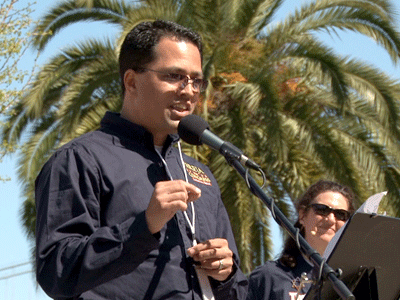
Hayward business owner runs for Congress ---
Chris Pareja was born in 1972, which is the same year that Pete Stark, 80, was first elected as a congressman. Running against Stark in November’s election, Pareja is hoping to end the senior congressman’s 39-year presence in office. The race is for the seat in Congress representing California's 15th Congressional District (CA-15), which includes all or parts of Livermore, Pleasanton, Sunol, Dublin, San Ramon, Castro Valley, San Lorenzo, Cherryland, Hayward, Union City, San Leandro, Fremont, Danville, Byron, Tracy and Oakland.
“I am a small business owner and five years ago I didn’t think I would ever be a politician,” says Pareja, who lives in Hayward with his wife and three children.
“I started reading new legislation; especially the healthcare bill and I became concerned about how it would negatively impact access to healthcare for the elderly and minorities. I started to get more active because I realized that the only way to get to have our voices represented in Washington is to have citizens from the community stand up and take our voice to Washington.”
Pareja is neither a Democrat nor a Republican – he is running as an independent.
“Government is broken and people all across the political spectrum are angry that career-politicians are putting the desires of big campaign donors ahead of the needs of the people they were elected to serve,” he says.
Pareja points to voter dissatisfaction with the two major parties, which are losing people who are going independent.
“It’s a sign that people are fed up,” he adds.
Independents are the largest and fastest-growing segment of the electorate. According to a Washington Post/ABC News poll, 41% of Americans describe themselves as independents, as opposed to Democrats or Republicans. Back in 1945, independents were only 15% of the voting public. In California, the number of independent voters has grown from 1.5 million in 1990 to more than 3.8 million in 2010.
“When we remove the political party labels and talk as people, 70 to 90 percent of us agree on the things we want to change,” says Pareja, who asserts that he is running as an independent to respond to the needs of local constituents instead of the needs of a particular party.
Ultimately, though, Pareja puts the responsibility with the people.
“Unfortunately many people vote the way their party tells them to but later find out that it is not in their personal interest or the interest of their community or state,” he says. “It is dangerous to blindly follow anyone instead doing some research and finding out what they are really about.”
“People are concerned but they are not really aware of what is being done to them instead of being done for them.”
Pareja acknowledges that it’s not possible for people to pay attention to every issue, “…but if there is something that we are particularly passionate about, we should pay attention to that.”
He believes that people can exercise their power by informing themselves about the issues and getting active in the political process.
“If you disagree with a politician, you can question them. Go to public meetings, speak out and let your voice be heard. When we are not educated about what is happening politicians are able to play on our emotions. As a society we are used to reacting emotionally and instead we should look for the facts and often when we do we will be surprised by the facts.”